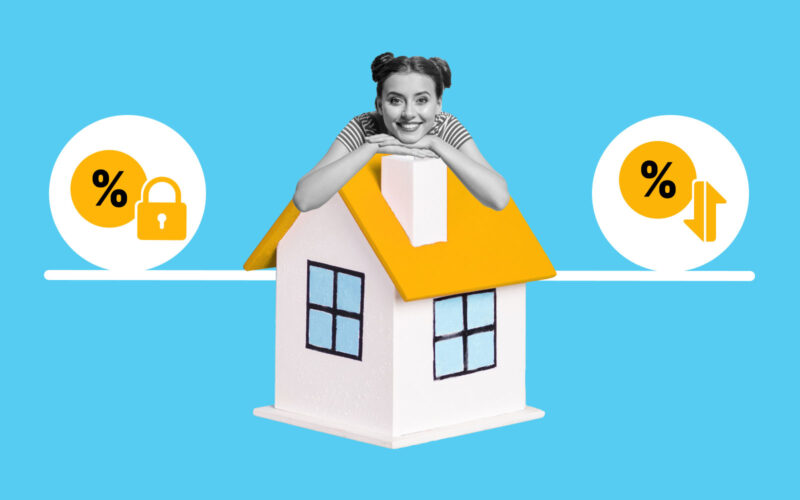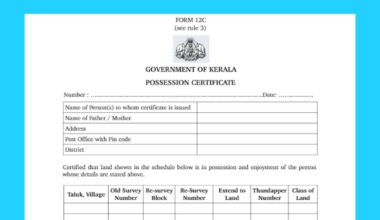Purchasing a home is a significant milestone for many individuals. To bring this dream to reality, individuals often require financial assistance in the form of a home loan. Deciding the type of interest rate for your home loan can, however, be quite a daunting task. Two popular options available to borrowers are fixed and floating interest rates on home loans. Each of these types of home loans comes with its own set of advantages and considerations, making the choice between the two an important decision that can significantly impact your financial future.
In this blog, we will explore the key differences between fixed and floating home loan interest rates and help you understand which option might be better suited to your needs. We will delve into the mechanics of each type, outline their pros and cons, and equip you with the knowledge necessary to make an informed decision about your home loan.
Understanding Fixed Home Loan
A fixed home loan is a type of mortgage where the interest rate remains the same for a set period of time. This means that the monthly repayments that you make towards your home loan will also stay consistent during that period. The fixed period is typically between one to five years, although it can be longer or shorter depending on the lender and the terms of the loan.
The advantage of a fixed home loan is that it provides stability and predictability in your monthly budget because you know exactly how much you need to pay each month. This can be helpful for planning and managing your finances. Even if interest rates in the market rise during the fixed period, your interest rate and repayments will remain unchanged.
However, it’s important to note that a fixed home loan may have some limitations. For example, you may have restrictions on making extra repayments or paying off the loan early without incurring additional fees. Additionally, once the fixed period ends, the loan usually reverts to a variable interest rate, which means your interest rate and repayments can change based on market conditions.
Understanding Floating Home Loan
A floating home loan, also known as a variable rate home loan, is a type of mortgage where the interest rate can change over time. Unlike a fixed home loan, the interest rate for a floating home loan is not fixed for a specific period.
The interest rate for a floating home loan is usually tied to a reference rate, such as the base rate set by the central bank or the lender’s own benchmark rate. When the reference rate changes, the interest rate on your loan can go up or down, causing your monthly repayments to increase or decrease accordingly.
The advantage of a floating home loan is that if interest rates in the market decrease, you may benefit from lower monthly repayments. However, if interest rates increase, your repayments will also go up. This can make it more challenging to plan and budget for your monthly expenses since the repayments can fluctuate.
Floating home loans often provide more flexibility compared to fixed home loans. For example, you may have the option to make extra repayments or pay off the loan early without facing significant penalties. Additionally, some floating home loans may offer features like offset accounts or redraw facilities that can help you save on interest or access additional funds if needed.
Difference Between Fixed and Floating Home Loan Interest Rate
| Aspect | Fixed Home Loan Interest Rate | Floating Home Loan Interest Rate |
|---|---|---|
| Stability | The interest rate remains the same for a predetermined period, typically 1-5 years. | The interest rate can change periodically based on market conditions. |
| Monthly Repayments | Monthly repayments remain consistent during the fixed period. | Monthly repayments can fluctuate as the interest rate adjusts. |
| Market Rate Changes | Your interest rate remains unaffected by market rate fluctuations during the fixed period. | Your interest rate can increase or decrease based on market conditions. |
| Budgeting and Planning | Provides stability and predictability for budgeting purposes. | Requires flexibility and adaptability in budgeting as repayments can change. |
| Extra Repayments | Some fixed home loans may have restrictions or fees on making extra repayments. | Floating home loans often offer more flexibility for extra repayments without significant penalties. |
| Loan Duration | The fixed interest rate period is typically 1-5 years, after which it may revert to a floating rate. | The floating interest rate can persist throughout the loan term or until you choose to switch to a fixed rate. |
How to Choose Between Floating Home Loan Interest and Fixed Home Loan Interest?
When choosing between a floating home loan interest rate and a fixed home loan interest rate, consider the following points to help guide your decision:
Choose a floating home loan interest rate if:
- Interest rates are currently high or are expected to decrease: Floating rates can offer benefits when market interest rates are high, as there is a possibility of rates decreasing in the future. This could result in lower repayments over time.
- You want flexibility: Floating home loans often provide more flexibility for extra repayments, redraw facilities, and features like offset accounts. If you anticipate having the ability to make additional repayments or access funds when needed, a floating rate loan may be suitable.
- You are comfortable with potential fluctuations: Floating rates can change periodically, leading to fluctuations in your monthly repayments. If you are financially prepared for the possibility of increased repayments in the future, a floating rate may be a viable option.
Choose a fixed home loan interest rate if:
- Interest rates are currently low or expected to increase: Opting for a fixed rate can be advantageous when market interest rates are low or projected to rise. It allows you to lock in a lower rate, providing stability and protection against potential rate hikes.
- You prefer stability and certainty: Fixed home loans offer predictable monthly repayments for the fixed rate period, allowing you to budget with confidence. This can be beneficial if you prefer stability and want to avoid the risk of potential interest rate fluctuations.
- You do not plan on making significant changes to the loan: Fixed rate loans often have limitations on extra repayments or may incur fees if you pay off the loan early. If you do not anticipate making significant changes to your loan during the fixed rate period, a fixed home loan may be suitable.
Conclusion:
Ultimately, the choice between a floating or fixed home loan interest rate depends on your individual financial circumstances, risk tolerance, and future outlook on interest rates. It’s advisable to seek professional advice from a financial advisor or mortgage broker to evaluate the options and select the most appropriate loan for your needs. Choosing between a fixed and floating home loan interest rate depends on your preference for stability or flexibility. Fixed rates offer predictable repayments, while floating rates allow for potential changes based on market conditions. Consider your financial goals and consult with a professional to determine the best option for you.








